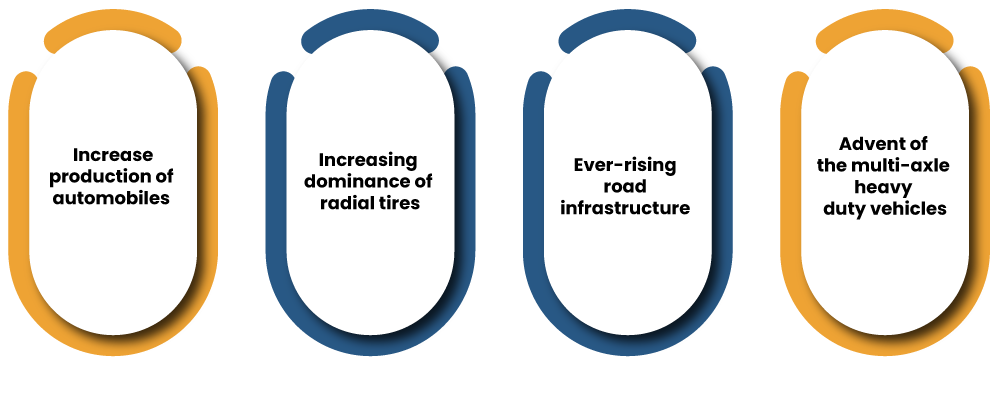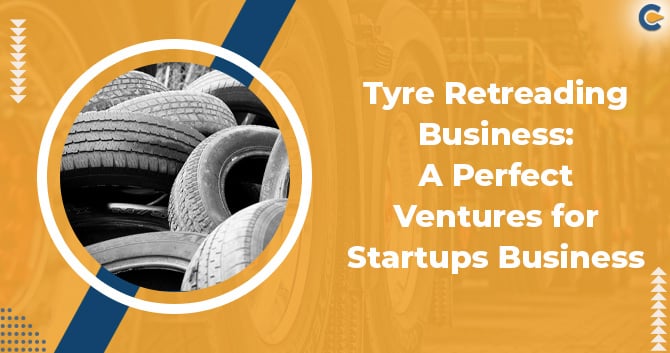Are you looking for a business model that seeks moderate investment and ensures stable and long-term growth in a tyre sector? Perhaps this is the right time to invest in a tyre retreading business. It is a business where restoration of worn-out and damaged tires is carried out through a dedicated technical process. Tyre Retreading Business is a very delicate process in which a worn tyre undergoes various stages of treatment, including vulcanization, to get completely revamped. This article takes a detailed snapshot of the legalities which is required to set up this venture in India.
What is a Tyre Retreading Process?
Retreadingrefers to a process through which a service life of an old tire is stretched out by renewing it. In this method, an old tyre with a moderate structural quality is taken off and subjected to a process in which it gets a renewed tread as well as new sidewall rubber. Further, the tire undergoes a curing process in a new rubber that is vulcanized to the original casing and thus, the tyre gets the new tread pattern.
*The part of the tire that remains in contact with the road surface is known as the thread. The tires threads are responsible for providing required traction on the road.
Typical Machinery set up for Tyre Retreading Business
Common machinery and equipment that are being used in Tyre Retreading Business are as follows:
- Tyre Nail Inspection Spreader
Tyre Inspection Machine - Laser Marking System
- Computer Controlled Buffing Machine
- Dust Collection System
- Tyre Repair Station
- Side Wall Repair
- Airless Spray Tank
- Vertical Solution Mixer
- Tread Building / Stretching Machine
- Extruder Machine
- Envelope Spreader
- Rim Mounting Station
- Twin Tilting Table
- Tire Curing Chamber
Read our article:What is the Procedure for Start-up Registration India?
Key Facts Regarding Tyre Retreading Business In India
- In India, the most of Tyre Retreading Business in India exists in the unorganized sector. Presently more than 20000 retreaders are operating across different parts of India
- The government in association with various avenues is making efforts to make this business sector as organized as possible.
- Tyre Retreading Business caters to a diverse range of demands, starting from commercial vehicle tyres to heavy-duty tires. This is one of the key reasons why this business sector is growing at a healthy rate.
- The advent of cutting-edge and improved technology is making Tyre Retreading process less costly and consumer-friendly.
- The cost of renewing an old tire via the tyre Retreading process attracts half of a cost of a new tyre.
- Tyre Retreading business regime is getting a consistent push from the ever-rising road infrastructure and automobiles. The common reasons for the growth of the tire retreading industry include;


Fundamental legalities for setting up Tyre Retreading Business in India
Here are some legal formalities that one needs to tackle for establishing a legally viable Tire Retreading Business in India
Obtain Company Registration
Obtaining Company registration is the first and the foremost step in any business journey. Following are the legal business forms that offer the best fit for the ventures like tyre retreading business
- LLP (Limited Liability Partnership)
- One Person Company, broadly known as OPC
- Partnership Firm
Keep takeaway:
- The notion of the LLP was come to effect in the year 2008. Technically, LLP possesses the traits of both a company &a partnership firm. These entities are mandated to perform their undertaking in line with norms under the Limited liability Partnership Act, 2008. Minimum two partners are required for the LLP’s incorporation. The said Act places on the limitation on the max. Numbers of partners.
- A partnership firm is governed by the Indian Partnership Act, 1932. It is a kind of business form where two or more individuals come together to laid a foundation of a business and divided the profits as per the agreed ratio. The contract drawn up between the partners is regarded as a partnership deed that sets out norms for partners under different several clauses.
- OPC or One Person Company is a popular business form in India. the concept of OPC was introduced in 2014 and since then it has attained massive popularity in the business landscape. OPC offers more solidity on the legal front when compared with sole Proprietorship firms. Registration applications for OPC can be filed via a web form, viz Spice+ on the MCA’s online portal.
- DSC (Digital Signature Certificate) will be required by the applicant firm to validate their filing undertaking on the MCA portal.
Trade License
A Trade license is a legal certificate that allows an individual to undertake a particular business activity in a specific location/area. Trade license holders are under legal compulsion of adhering to norms issued by the State Municipal Corporation[1]. It mandates the business owners to avert business activities that are against the interest of workers as well as masses outside. A trade license is granted by the licensing department of the municipal corporation. Keep in mind that the grant of this license differs state-wise depending on the rules set out by the local government agencies
Factory License
As perthe norms of the Factory Act, 1948, it is a legal compulsion for all factory owners to legalize their establishment with the local governing institution before commencing the business activities. It is in the hand of the Chief Inspector of the Labour Commissioner Organisation to accord this license to the applicant after registration of the premises.
NOC from State Pollution Control Board
Every pollution emitting entity, including tyre retreading business, in India is mandated to obtain a No objection certificate from the State Pollution Control Board. Since tire retreading setups generate a significant amount of pollution, they are also required to obtain this NOC. Applicants seeking such permission can approach regional offices and apply for the same through an electronic mode. While dealing with the filing process, the applicant is required to submit the site details, pollution control plans, & industry registration certificates.
GST Registration
In the GST landscape, entities whose yearly revenue surpasses Rs 40 lakhs* (Rs 10 lacs for entities situated in hill states of Northern Eastern region) is mandated to register the as normal taxable individual. For certain establishments, GST registration is mandatory. A penalty would be levied on the entity that opts to pursue its business activities without this registration. GST registration also mandates entities dealing with the interstate selling of products and services.
Professional Tax registration
Registration under the Professional Tax is mandatory within 30 days of hiring staff in a business. Application pertaining to the Registration Certificate ought to be made to the respective state tax department within the said timeline.
ESI (Employees’ State Insurance Corporation) registration
ESI is an abbreviated form of the term Employee State Insurance administered by Employee State Insurance Corporation (ESIC) which is an independent institution created under the Ministry of Labour and Employment, GOI.
The scheme was deployed for the benefit of Indian workers. The workers registered under ESIC have access to medical and monetary benefits rendered by the employer. Any company & non-seasonal factory having more than 10 workers (is some states it is 20 employees) who have a max salary of Rs 21,000 has to compulsorily register itself with the ESIC.
EPFO registration
The Central Government has mandated the entities having less than 20 employees to contribute to EPF by facilitating them two months ‘notice. Entities with manpower less than 20 can also make voluntary contributions towards EPF. The owner & the employees each contribute 12% of the employee’s basic salary toward the EPF account. In case the entity having manpower less than 20, the employer’s contribution will come out to be 10%.
BIS certification
BIS certification is mandatory for all entities working in the tire industry. This includes a retreader as well. The BIS (aka, Bureau of Indian Standards) is liable for protecting public health, safeguard end-users from hazardous products & facilitate quality assurance to the customers.
MSME Certification
MSME certification (aka Udhyog Aadhaar Certification) is an absolute requirement for small entities since it facilitates ample boost that is required for growth.
ISO certification
ISO certification is a global certification that manifests the company’s ability to deliver high-quality products for the end-users. Acquiring ISO certification won’t be an easy job since it attracts a lot of paperwork and technicalities. Thus; it is advisable to hire an expert to serve that purpose.
Why Tyre Retreading Business is gaining traction in the Indian Marketplace?
The success of the Tyre Retreading Business in India mainly lies in the advantages offered by the retreaded tyres over the new ones. Here are some pros of retreaded tyres that stimulate the growth of the Tyre Retreading business.
- Retreads offer uncompromised safety and quality, just like the new tires. heeler tires to commercial vehicles.
- Retreading doesn’t offer any harm to the environment.
- Technically, the production of new tyres consumes 83 L of oil in general; whereas, in the Tyre Retreading process, this quantity comes down to 7 liters. Thus, the rate of production of the new tire is significantly higher than that of revamped tires. The increased production rate of the new tire is further translated to a higher MRP.
- There is a common misconception that retreading tires are prone to wear and tear and are less efficient. Truth be told, such tires are equally good as the new tires provided they are not subjected to harsh driving.
- Revamped tires consume only one-fourth of the amount of natural rubber that is being used to the produced new tire.
- The overall service life of rethreaded tires is almost the same as of the new tires. Retreading extends the overall service life of the used tires; therefore making the entire process of tire production recyclable.
- The investment for setting up retreading unit is relatively lower. The primary part of the investment is involved in procuring the equipment and molds
Analyzing the Scope of Tyre Retreading Business via Prevailing Market Condition
- In 2020, the global market size of the Tyre Retreading regime was stood at 7816.4 million dollars. Experts strongly believe that this figure could attain a valuation of 10120 million dollars by 2026, at a CAGR of 4.4%.
- Asia was the first economy that shown the prompt recovery from the shutdown related to the Covid-19 outbreak. Despite the short-term setbacks, ongoing economic expansion & industrialization is boosting the personal income level in an Asian nation, which has led to higher vehicle ownership. This trend is underpinning dynamic opportunities for tires sales.
- India, China & Japan collectively dominate 70% of the Asia tire market and are considered as the behemoth of the global tire market. Despite considerable setbacks created by the Covid-19 virus, the Asian tire market is projected to experience a major push at an average of 3.6% until 2025.
- The increased per capita income of Indian people is also elevating the automobile ownership rates, thereby increasing the scope of Tyre Retreading business in India.
- The Asian Tire market has a wide landscape and it is highly diverse, with a huge presence of passenger and commercial vehicles. The prominent market is also available for buses, medium and heavy-duty trucks, & specialty applications such as bikes, OTR equipment, and aviation tires.
Conclusion
If you looking to pinpoint a business opportunity in a tire sector the offers long-term substantiality and growth then look no further than the Tyre Retreading Business. This is a kind of business model that adheres to a lot of potential both in terms of longevity and stability.
The demand for retreaded tyres has gained a great impetus in the past few years owing to the increasing cost of new tyres. Also, there is a wider consumer landscape that favorsretreaded tyres instead of new ones, because of their low cost. Tyre Retreading Business is a boon for startups who are in search of ventures that ensure good solidity on the ROI front.
Read our article:Top 5 Ventures for EXIM Business in India











